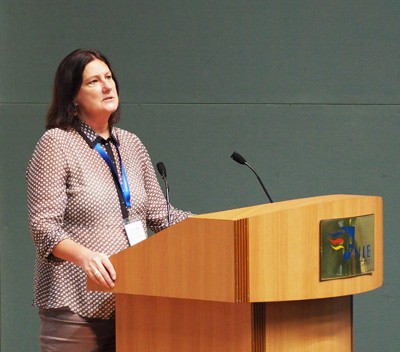Young Children’s Voices in Mathematical Problem Solving
Contributed by Dr Ho Siew Yin and Sng Wei Qin Abbie, from NTUC First Campus, for SingTeach Virtual […]
Read More
When it comes to the future, Professor Erica McWilliam says there are concepts we need to unlearn now in order to optimise our educational endeavours for the future. What implications will this have for teaching the Generation Z? What is the role that Arts and Humanities teachers can play as leaders of pedagogical change for the future? This article is based on her keynote address at the Arts, Humanities & Literature Conference 2015.
We used to think the future would be about Big Machines. Now we see that the future is largely about nanotechnology – characterized by very small machines and very large amount of data. Though we now know a lot more than people in times past, we have never been more ignorant.
What do we mean by this? This really means that the difference between knowledge that is embedded in our environment, and what we actually know, has never been greater.
In past times, during the age of our parents or grandparents for example, people could fix things and make things happen in their own environment. If, for instance, a fan does not spin or a butter-churner does not churn, they would know how to make it spin and churn. In other words, they could make things happen without having to turn to somebody else in say, Silicon Valley, who could fix this. They were very close to the knowledge around them.
Now, by contrast, we have never been more ignorant. And the issue for us is that if we don’t realize this, we cannot simply hope that our present knowledge is going to be adequate for addressing our future.
As mentioned by journalist and social commentator Charles Leadbeater, as often or not, it is our knowledge that prevents us from taking risks, not our ignorance. If I know that jumping across the cliff will get me hurt, I’m not going to try. If I know that my long-jumping skills are not going to help me get across to the other side safely, I wouldn’t want to try.
This seems to make sense as it is about self-preservation. But the issue for us is when we say “I know” in the area of teaching – “I know what a good teacher should look like”, “I know how teachers are supposed to engage their students” or “I know what teachers need to do to be well-prepared”, then we are likely to keep doing things in classrooms that are not relevant to our times.
We expect teachers to be knowledgeable, and in control. But given the importance of acknowledging ignorance, what about a confused teacher? What about a “co-learning” teacher? Can we imagine teachers who would take on that sort of risk? Can we imagine teachers tapping on technology and ideas that they are not familiar with? More importantly, are teachers prepared to look usefully ignorant in front of their students?
While we still need teachers who are knowledge experts in their subject domain, we also need to understand how to be usefully ignorant when it comes to pedagogy. This is one of the big issues for us in terms of our future and how we are to understand it.

What, then, can we, as arts and humanities teachers, do to help young people in their learning?
Many students who work with technology and online environments engage in “moving” knowledge around as a form of “serious play”. In other words, they derive satisfaction and learn more deeply through mixing, matching and assembling ideas and information in a playful way. Futurist Pat Kane argues that play will be to the 21st century what work was to 300 years of industrial society – our dominant way of knowing, doing and creating value. This is a hard idea to those who think that play is frivolous and something to be done only after the work is completed or as a break from work.
An example of “serious play”: It is possible to teach Shakespeare’s Macbeth (as I have done) in ways that engage students playfully but with a purpose. Students who don’t want to read Shakespeare can be engaged by considering a scenario where they are investigators or detectives tasked to find out the means, motives and opportunities at how King Duncan was killed.
Through playing with possibilities, some of which are correct and others not so, students understand more deeply the plot of the story. They are asked to imagine themselves to be in the story, its setting (castle), and meeting the characters. Once they are immersed in the plot and riddles, they begin to understand the story better, and have few problems reading the original. They do not need it “translated” because they now have access to it. We should not throw out the great classics, but we really need to think in terms of a pedagogy which gives better access to complex and unfamiliar ideas and language. And one way to do this is through serious play that allows students to think hard, experiment, re-think, re-imagine. And that is learning at its best!